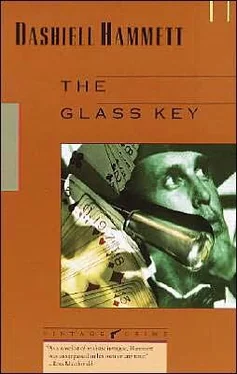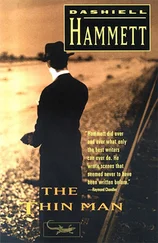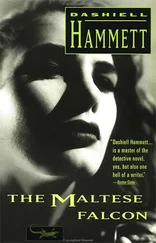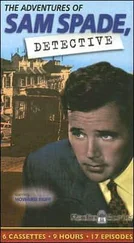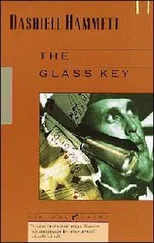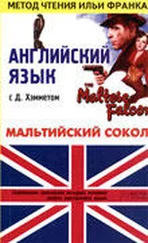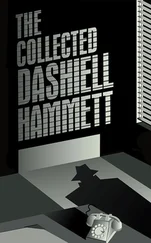"Can't, Mom," he told her. "I've got to go places."
Her blue eyes wherein age did not show became bright and keen. "When did you leave the hospital?" she demanded.
"Just now."
She put her lips together hard, then opened them a little to say accusingly: "You walked out." A shadow disturbed the clear blueness of her eves. She came close to Ned Beaumont and held her face close to his: she was nearly as tall as he. Her voice was harsh now as if coming from a parched throat. "Is it something about Paul?" The shadow in her eyes became recognizable as fear. "And Opal?"
His voice was barely audible. "It's something I've got to see them about."
She touched one of his cheeks somewhat timidly with bony fingers. "You're a good boy, Ned," she said.
He put an arm around her. "Don't worry, Mom. None of it's bad as it could be. Only—if Opal comes home make her stay—if you can."
"Is it anything you can tell me, Ned?" she asked.
"Not now and—well—it might be just as well not to let either of them know you think anything's wrong."
2
Ned Beaumont walked five blocks through the rain to a drug-store. He used a telephone there first to order a taxicab and then to call two numbers and ask for Mr. Mathews. He did not get Mr. Mathews on the wire.
He called another number and asked for Mr. Rumsen. A moment later he was saying: "'Lo, Jack, this is Ned Beaumont. Busy? . . . Fine. Here it is. I want to know if the girl we were talking about went to see Mathews of the Observer today and what she did afterwards, if she did.
That's right, Hal Mathews. I tried to get him by phone, there and home, but no luck. . . . Well, on the quiet if you can, but get it and get it quick. . . . No, I'm out of the hospital. I'll be home waiting. You know my number. . . . Yes, Jack. Fine, thanks, and ring me as often as you can. . . . 'By."
He went out to the waiting taxicab, got into it, and gave the driver his address, but after half a dozen blocks he tapped the front window with his fingers and gave the driver another address.
Presently the taxicab came to rest in front of a squat greyish house set in the center of a steeply sloping smooth lawn. "Wait," he told the driver as he got out.
The greyish house's front door was opened to his ring by a red-haired maid.
"Mr. Farr in?" he asked her.
"I'll see. Who shall I tell him?"
"Mr. Beaumont."
The District Attorney came into the reception-hall with both hands out. His florid pugnacious face was all smiling. "Well, well, Beaumont, this is a real pleasure," he said as he rushed up to his visitor. "Here, give me your coat and hat."
Ned Beaumont smiled and shook his head. "I can't stay," he said. "I just dropped in for a second on my way home from the hospital."
"All shipshape again? Splendid!"
"Feeling pretty good," Ned Beaumont said. "Anything new?"
"Nothing very important. The birds who manhandled you are still loose—in hiding somewhere—but we'll get them."
Ned Beaumont made a depreciatory mouth. "I didn't die and they weren't trying to kill me: you could only stick them with an assault-charge." He looked somewhat drowsily at Farr. "Had any more of those three-question epistles?"
The District Attorney cleared his throat. "Uh—yes, come to think of it, there were one or two more of them."
"How many?" Ned Beaumont asked. His voice was politely casual. The ends of his lips were raised a little in an idle smile. Amusement glinted in his eyes, but his eyes held Farr's.
The District Attorney cleared his throat. "Three," he said reluctantly. Then his eyes brightened. "Did you hear about the splendid meeting we had at—?"
Ned Beaumont interrupted him. "All along the same line?" he asked. "Uh—more or less." The District Attorney licked his lips and a pleading expression began to enter his eyes.
"How much more—or less?"
Farr's eyes slid their gaze down from Ned Beaumont's eyes to his necktie and sidewise to his left shoulder. He moved his lips vaguely, but did not utter a sound.
Ned Beaumont's smile was openly malicious now. "All saying Paul killed Taylor Henry?" he asked in a sugary voice.
Farr jumped, his face faded to a light orange, and in his excitement he let his startled eyes focus on Ned Beaumont's eyes again. "Christ, Ned!" he gasped.
Ned Beaumont laughed. "You're getting nerves, Farr," he said, still sugary of voice. "Better watch yourself or you'll be going to pieces." He made his face grave. "Has Paul said anything to you about it? About your nerves, I mean."
"N-no."
Ned Beaumont smiled again. "Maybe he hasn't noticed it—yet." He raised an arm, glanced at his wrist-watch, then at Farr. "Found out who wrote them yet?" he asked sharply.
The District Attorney stammered: "Look here, Ned, I don't—you know—it's not—" floundered and stopped.
Ned Beaumont asked: "Well?"
The District Attorney gulped and said desperately: "We've got something, Ned, but it's too soon to say. Maybe there's nothing to it. You know how these things are."
Ned Beaumont nodded. There was nothing but friendliness in his face now. His voice was level and cool without chilliness saying: "You've learned where they were written and you've found the machine they were written on, but that's all you've got so far. You haven't got enough to even guess who wrote them."
"That's right, Ned," Farr blurted out with a great air of relief.
Ned Beaumont took Farr's hand and shook it cordially. "That's the stuff," he said. "Well, I've got to run along. You can't go wrong taking things slowly, being sure you're right before you go ahead. You can take my word for that."
The District Attorney's face and voice were warm with emotion. "Thanks, Ned, thanks!"
3
At ten minutes past nine o'clock that evening the telephone-bell in Ned Beaumont's living-room rang. He went quickly to the telephone. "Hello.
Yes, Jack. . . . Yes. . . . Yes. . . . Where? . . . Yes, that's fine. . . . That'll be all tonight. Thanks a lot."
When he rose from the telephone he was smiling with pale lips. His eyes were shiny and reckless. His hands shook a little.
The telephone-bell rang again before he had taken his third step. He hesitated, went back to the telephone. "Hello. . . . Oh, hello, Paul.
Yes, I got tired of playing invalid. . . . Nothing special—just thought I'd drop in and see you. . . . No, I'm afraid I can't. I'm not feeling as strong as I thought I was, so I think I'd better go to bed. . . . Yes, tomorrow, sure. . . . 'By."
He put on rain-coat and hat going downstairs. Wind drove rain in at him when he opened the street-door, drove it into his face as he walked half a block to the garage on the corner.
In the garage's glass-walled office a lanky brown-haired man in once-white overalls was tilted back on a wooden chair, his feet on a shelf above an electric heater, reading a newspaper. He lowered the newspaper when Ned Beaumont said: "'Lo, Tommy."
The dirtiness of Tommy's face made his teeth seem whiter than they were. He showed many of them in a grin and said: "Kind of weatherish tonight."
"Yes. Got an iron I can have? One that'll carry me over country roads tonight?"
Tommy said: "Jesus! Lucky for you you could pick your night. You might've had to go on a bad one. Well, I got a Buick that I don't care what happens to."
"Will it get me there?"
"It's just as likely to as anything else," Tommy said, "tonight."
"All right. Fill it up for me. What's the best road up Lazy Creek way on a night like this?"
"How far up?"
Ned Beaumont looked thoughtfully at the garageman, then said: "Along about where it runs into the river."
Tommy nodded. "The Mathews place?" he asked.
Ned Beaumont did not say anything.
Tommy said: "It makes a difference which place you're going to."
Читать дальше
